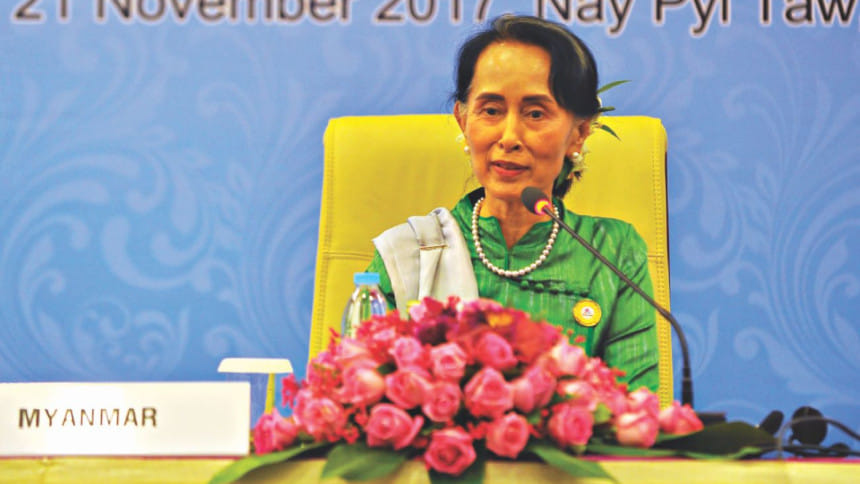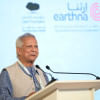Talks on track for Rohingya deal

Dhaka and Naypyitaw are in negotiation for reaching a bilateral agreement in a couple of days on repatriation of over six lakh Myanmar nationals who have taken shelter in Bangladesh to escape persecution in Rakhine State.
Foreign Minister AH Mahmood Ali, now in Naypyitaw to attend a conference, will hold bilateral talks today and tomorrow to form a joint working group to facilitate the repatriation.
He yesterday expressed optimism about striking a deal with Myanmar over Rohingya repatriation. "Chances look good. Let's see,” he said.
According to diplomatic sources, Bangladesh and Myanmar have agreed in principle to sign an agreement on repatriation of the Rohingyas, but are yet to disclose the details of the plan, terms and conditions or criteria.
Officials from both countries began discussions last month on how to process documents of the Rohingyas willing to return to Myanmar.
Last week, Myanmar army chief said that it was “not possible” to accept the number of refugees proposed by Dhaka.
Myanmar's de facto leader Aung San Suu Kyi yesterday hoped to strike a deal with Bangladesh by this week on the “safe and voluntary return” of the Rohingyas who fled to Bangladesh since August 25.
"Nothing can be done overnight, but we believe that we will be able to make steady progress," she said.
Turning to the question of repatriation of the Rohingyas, Suu Kyi said discussions would be held with the Bangladesh foreign minister today and tomorrow.
She, however, said it was hard to tell exactly how close Myanmar and Bangladesh were to an agreement.
“We hope that this would result in an MoU signed quickly, which would enable us to start the safe and voluntarily return of all of those who have gone across the border,” Suu Kyi said at the end of a meeting of senior officials at an Asia-Europe Meeting (ASEM) in Myanmar's capital Naypyitaw, reports Reuters.
In response to a question about human rights violations, Suu Kyi told reporters, “We can't say whether it has happened or not. As a responsibility of the government, we have to make sure that it won't happen.”
She said Myanmar would follow the framework of an agreement reached in the 1990s to cover the earlier repatriation of Rohingyas.
“It's on the basis of residency...this was agreed by the two governments long time ago with success, so this will be the formula we will continue to follow,” added Suu Kyi.
Dhaka, however, has not agreed to Naypyitaw's proposal to follow the principle and criteria of the 1992 deal to take back the forcibly displaced Myanmar nationals.
On October 9, Mahmood Ali told foreign diplomats in Dhaka that the 1992 criteria are not “realistic”.
He said the situation of 1992 and the present one are “entirely different” as most of the Muslim villages in the northern Rakhine State have been burned down this time, and the identification of Rohingyas based on residency in Rakhine would not be realistic.
On April 28, 1992, Bangladesh signed a joint statement with the State Law and Order Restoration Council (SLORC) of Myanmar under which Myanmar agreed to the return of those refugees who could “establish their bona fide residency in Myanmar” prior to their departure for Bangladesh.
Foreign Secretary Md Shahidul Haque and some key officials of the foreign ministry left Dhaka for Naypyitaw yesterday to take part in the negotiation over the repatriation deal.
“It is now almost certain that a deal will be signed,” said a key foreign ministry official, seeking anonymity.
Dhaka will strongly press for the UN's inclusion in the repatriation process, added the official.
Myanmar, however, does not want the presence of the UN or any other international organisations in the repatriation process.
The UN and the international community have been calling for the safe, voluntary and sustainable repatriation of the Myanmar nationals to their places of origin.
Bangladesh, which has also made the same call, is now desperate to send back the Myanmar nationals at any cost.
“Of course, we want safe, dignified and sustainable return of the refugees to their homeland. But above all, we want their quick repatriation,” said a foreign ministry official on condition of anonymity.
At a press briefing at the UN headquarters on Monday, Farhan Haq, deputy spokesperson for the UN secretary‑general, said the number of Rohingya refugees, who have fled to Bangladesh from Myanmar since August 25, has reached 621,000.
“They are arriving traumatised and destitute, with more than half living in a single camp in Cox's Bazar,” he said.
Bangladesh had seen influx of Rohingya refugees from Myanmar also in 1978, 1991 and 2012.

 For all latest news, follow The Daily Star's Google News channel.
For all latest news, follow The Daily Star's Google News channel. 








Comments